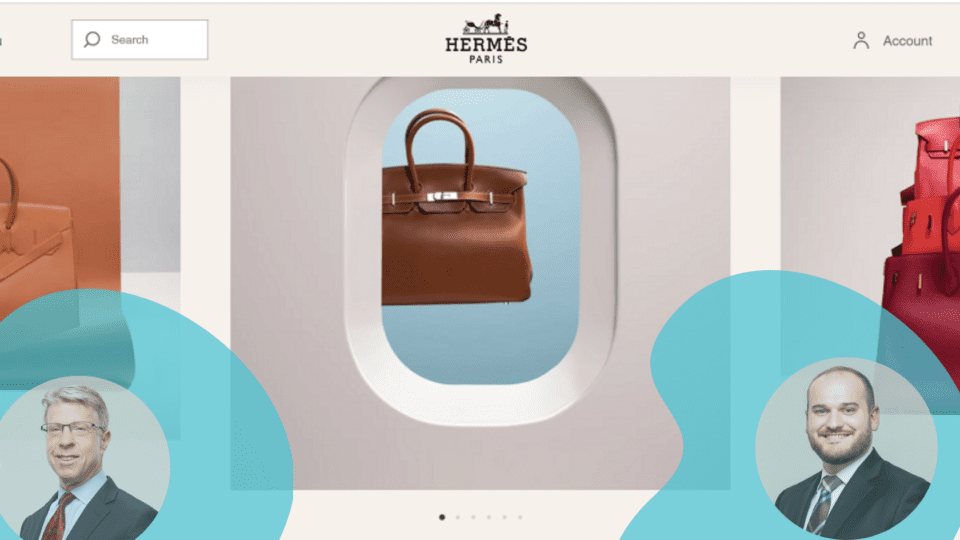Today’s world is undeniably digital and becoming ever more so. And today’s digital world is ubiquitous, from the popularization of Web3, the growth of the metaverse and, of course, the proliferation of NFTs.
Over the past several years, NFTs have worked their way into multiple sectors, from rare icons that can be used as profile images to badges denoting attendance at prominent events to digital collectibles offered by big and small companies alike that come with real-world benefits. As NFTs have grown, one of the most common questions raised is how they intersect with long-established intellectual property rights.
The recent federal jury decision in Hermès International SA v. Rothschild is the first major decision dealing with that issue. The case involved the Hermès luxury design house and its iconic Birkin bags and an NFT creator that goes by the pseudonym Mason Rothschild. In December 2021, Rothschild began selling “MetaBirkin” NFTs that displayed Birkin bags. To protect its Birkin name and bags, which Hermès has used for decades since the 1980s, Hermès sued Rothschild for trademark infringement.
Unphased, Rothschild claimed he was an “artist” (comparing himself to Andy Warhol), whose MetaBirkins NFTs were constitutionally protected works of transformative art providing social commentary on Hermès’ “ultra-expensive” Birkin bags. But the jury didn’t see it that way. The jury viewed the MetaBirkins NFTs not as transformative art but as a commercial exploitation deliberately intended to profit from the goodwill and value of Hermès famous Birkin brand, and thus found that Rothschild was not protected by the First Amendment and infringed Hermès’ Birkin trademarks. As a result, Rothschild was ordered to pay Hermès $133,000 in damages.
The immediate impact of this case is clear. As the digital marketplace continues to grow, as NFTs continue to evolve and as new digital mediums continue to develop, brand owners like Hermès and others will not be left without protection. The Hermès decision gives a clear warning to NFT and other creators that no open season exists to commercially use a company’s well-established brand (like the Birkin brand) while heralding the repetitive refrain that such use is constitutionally protected artistic expression.
That is so even where, as in this case, the party asserting rights has yet to establish a presence in the meta-marketplace. Bottom line: if somebody commercially exploits another’s brand with the intent to profit from and mislead consumers about that brand, mere cries of artistic expression will not shield such conduct from a brand owner’s trademark rights.
That said, this case does not ring the death knell for transformative art, including its use as social commentary on brands. The delicate balance between constitutionally protected speech under the First Amendment to the Constitution and those rights protected under federal trademark law — a balance in place long before NFTs and the digital marketplace existed and one that will likely continue to exist long into the future — continues to be a fact-intensive and fact-dependent analysis.
Here, the testimony at trial suggested that Rothschild set out with the foremost purpose of leveraging Hermès goodwill, with subtle at best and attenuated at worst social commentary. The jury found the underlying facts pointed to Rothschild making more of a commercial, rather than artistic, expression that was unprotected by the First Amendment. In another scenario, where there is no evidence of bad intent to leverage the goodwill of a famous brand or less attenuated social commentary, the scales remain ready to tip toward protection.
For now, this decision affirms brand protection in the meta-marketplace, including against the unfair commercial exploitation of brands as colorable “art.” This decision should steer pseudo-creators away while providing comfort to those artists who are genuinely expressing protected free speech.
Further clarity over the intersection of the First Amendment and intellectual property is certain to come from two much anticipated pending Supreme Court cases, one involving Jack Daniels and a pun-laden dog toy that looks like a bottle of Jack and the other involving Andy Warhol’s portrait of Prince.
Mark Sommers, Trademark Partner at the law firm Finnegan, is frequently named as one of the nation’s elite trademark litigators and practitioners. Peer reviews and rankings, like World Trademark Review 1000 and The Legal 500, place him at the very pinnacle of the profession. Patrick Rodgers, an Associate at Finnegan, focuses on trademark and false advertising litigation. He routinely litigates cases in federal district courts around the country as well as before the Trademark Trial Appeal Board (TTAB) of the U.S. Patent and Trademark Office (USPTO) for some of the world’s most well-known brands in a broad range of industries, including sports and fitness, apparel, health and wellness, and other consumer goods.




